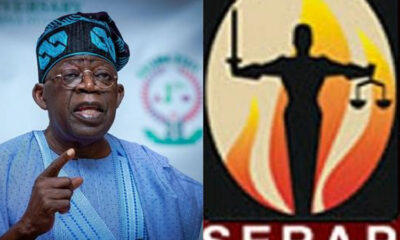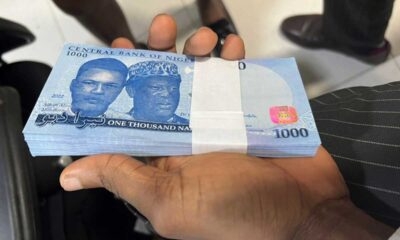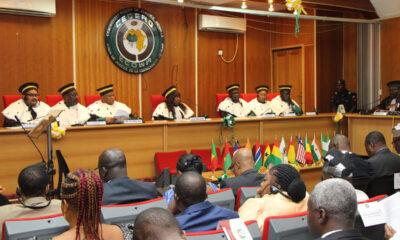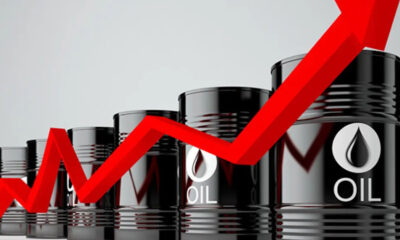News
Reverse petrol price hike, probe NNPC, SERAP tells Tinubu
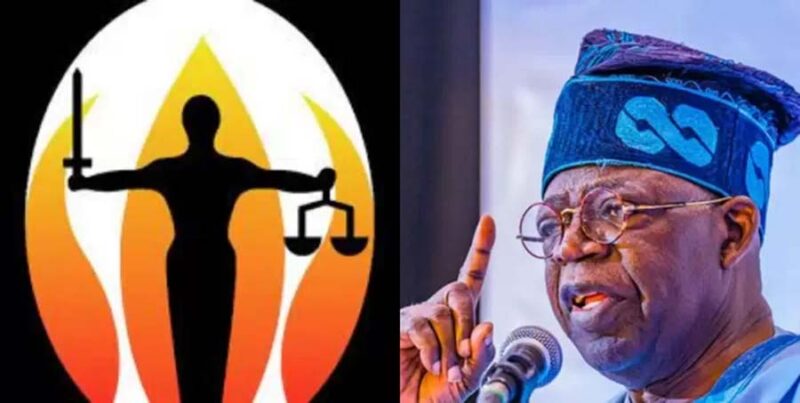
Reverse petrol price hike, probe NNPC, SERAP tells Tinubu
Socio-Economic Rights and Accountability Project (SERAP) has urged President Bola Tinubu to use his “leadership position and good offices to direct the Nigerian National Petroleum Company Limited (NNPCL) to immediately reverse the apparently illegal and unconstitutional increase in the pump price of premium motor spirit (PMS), also known as petrol, across its retail outlets.”
SERAP urged him to “direct the Attorney General of the Federation and Minister of Justice Mr Lateef Fagbemi, SAN, and appropriate anti-corruption agencies “to probe the allegations of corruption and mismanagement in the NNPC, including the spending of the reported $300 million ‘bailout funds’ collected from the Federal Government in August 2024, and the $6 billion debt it owes suppliers, despite allegedly failing to remit oil revenues to the treasury.”
SERAP said, “Suspected perpetrators of alleged corruption and mismanagement in the NNPC should face prosecution as appropriate, if there is sufficient admissible evidence, and any proceeds of corruption should be fully recovered.”
In the open letter dated 7 September 2024 and signed by SERAP deputy director Kolawole Oluwadare, the organisation said: “The increase in petrol price constitutes a fundamental breach of constitutional guarantees and the country’s international human rights obligations.”
SERAP said, “Nigerians have for far too long been denied justice and the opportunity to get to the bottom of why they continue to pay the price for corruption in the oil sector.”
The letter, read in part: “Rather than pursuing public policies to address the growing poverty and inequality in the country, and holding the NNPC to account for the alleged corruption and mismanagement in the oil sector, your government seems to be punishing the poor.
“The increase in petrol price has rendered already impoverished citizens incapable of satisfying their minimum needs for survival.”
“The increase is not inevitable, as it stems from the persistent failure of successive governments to address allegations of corruption and mismanagement in the oil sector and the impunity of suspected perpetrators.”
READ ALSO:
- U20 Women W’Cup: Falconets cruise past Venezuela, make last 16
- Nigeria’s daily petrol consumption rises from 30m litres to 60m – NMDPRA
- Lagos chiefs enforce monarch’s price reduction order in community market
“Corruption in the oil sector and the lack of transparency and accountability in the use of public funds to support the operations of the NNPC have resulted in persistent and unlawful hike in petrol prices.”
“Holding the NNPC to account for alleged corruption and mismanagement in the oil sector would serve legitimate public interests.”
“The increase is causing immense hardship to those less well-off. We are concerned that as the economic situation in Nigeria deteriorates, the increase in petrol price is pushing people further into poverty.”
“We would be grateful if the recommended measures are taken within 48 days of the receipt and/or publication of this letter. If we have not heard from you by then, SERAP shall consider appropriate legal actions to compel your government to comply with our request in the public interest.”
“Increasing petrol prices at a time when millions of Nigerians continue to face worsening economic conditions is entirely inconsistent with your government constitutional and international obligations to ensure the minimum living conditions compatible with human dignity.”
“The arbitrary increase has placed a disproportionate burden on the marginalized and most vulnerable sectors of society, particularly those disadvantaged by poverty.”
“The increase is seriously jeopardizing their living conditions, well as individuals’ physical, emotional, and individual development, and intensifying and worsening socioeconomic conditions in the country.”
“The increase constitutes a serious human rights problem because of the intensity with which it undermines the enjoyment and exercise by Nigerians of their human rights and renders their civic participation illusory.”
“The fundamental right to life includes not only the right of every Nigerian not to be deprived of his/her life arbitrarily, but also the right that he/she will not be prevented from having access to the conditions that guarantee a dignified existence.”
“The growing poverty and inequality in the country has continued to adversely affect the right of Nigerians to participatory democracy, and impede their ability to participate in their own government.”
READ ALSO:
- Another 196 soldiers reportedly quit Nigerian Army
- Opay, Moniepoint, others begin FG levy on transactions above N10,000 tomorrow
- Power belongs to God, Otti replies Deputy Speaker Kalu over 2027 Imo gov poll
“Persistent increase in petrol prices keep people in poverty which in turn perpetuates discriminatory attitudes and practices against them.”
“Your government has a legal obligation to mobilize the maximum of the country’s available resources to ensure people’s socio-economic rights and to protect the most vulnerable and disadvantaged Nigerians.”
“Your government also has the legal obligations to probe and prosecute allegations of corruption and mismanagement in the NNPC, and to ensure access to justice and effective remedies for victims of corruption.”
“Investigating and prosecuting allegations of corruption and mismanagement in the oil sector would be entirely consistent with the Nigerian Constitution, and the country’s international anti-corruption obligations.”
“Section 13 of the Nigerian Constitution 1999 [as amended] imposes clear responsibility on your government to conform to, observe and apply the provisions of Chapter 2 of the constitution. Section 15(5) imposes the responsibility on your government to ‘abolish all corrupt practices’ including in the NNPC.”
“Under Section 16(1) of the Constitution, your government has a responsibility to ‘secure the maximum welfare, freedom and happiness of every citizen on the basis of social justice and equality of status and opportunity.’”
“Section 16(2) further provides that, ‘the material resources of the nation are harnessed and distributed as best as possible to serve the common good.’”
“According to our information, the Nigerian National Petroleum Company (NNPC) Limited recently increased the price of premium motor spirit (PMS), also known as petrol, across its retail outlets.”
“The price of the product increased to N855 per litre, from about N600, and in some instances above N900 per litre. The apparently unlawful increase in petrol price followed a scarcity caused by the reported refusal by suppliers to import petroleum products for the NNPCL over a $6 billion debt.”
“The NNPC reportedly failed to remit USD$2.04 billion and N164 billion of oil revenues into the public treasury, as documented in the recently published 2020 annual report by the Auditor-General of the Federation.”
Reverse petrol price hike, probe NNPC, SERAP tells Tinubu
News
Tinubu jets out to France on three-day visit

Tinubu jets out to France on three-day visit
President Bola Tinubu will travel to France today (Wednesday) for a three-day state visit at the instance of the French president.
A statement issued by the President’s Special Adviser on Information and Strategy, Bayo Onanuga, confirmed this.
It said, “The Nigerian leader’s three-day visit, which will focus on strengthening political, economic, and cultural relations and establishing more opportunities for partnership, particularly in agriculture, security, education, health, youth engagement and employment, innovation, and energy transition, promises significant benefits for Nigeria.”
Onanuga said Tinubu and Macron would harmonise positions on stimulating more interest in exchange programmes that focus on skill development for youths and improving their competencies in automation, entrepreneurship, innovation, and leadership.
“Both leaders will participate in political and diplomatic meetings highlighting shared values on finance, solid minerals, trade and investments, and communication,” he added.
“They will also witness a session by the France-Nigeria Business Council, which oversees private sector participation in economic development.”
The presidential adviser stated that the Nigerian first lady and her French counterpart would discuss solutions for empowering women, children, and the most vulnerable through the Renewed Hope initiative.
News
Yahaya Bello reports to EFCC office with lawyers

Yahaya Bello reports to EFCC office with lawyers
A former Governor of Kogi State, Yahaya Bello, on Tuesday visited the Economic and Financial Crimes Commission (EFCC) to honour another invitation extended to him over alleged misappropriation of funds.
Bello went to the anti-graft office with his lawyers in the morning.
The ex-Kogi governor reportedly drove himself to the EFCC’s office in a black Toyota Hilux van with some lawyers.
He was said to have been taken by some operatives of the agency and are currently being grilled.
This is coming after the Supreme Court judgment which dismissed a suit brought by some state governments challenging the constitutionality of the agency.
The EFCC at the last hearing on November 14, sought the adjournment till November 27 in the fresh case it instituted against Bello.
It stated that the 30-day window was still running for the summons earlier issued.
News
Just in: Ebonyi governor suspends two commissioners, Perm Sec for misconduct
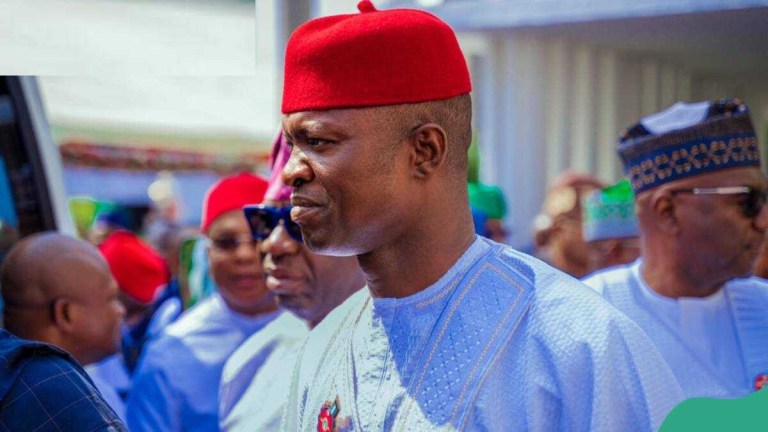
Just in: Ebonyi governor suspends two commissioners, Perm Sec for misconduct
Ebonyi State Governor Francis Nwifuru has announced the immediate suspension of two commissioners with a permanent secretary among others for gross misconduct.
Those suspended are the Commissioner for Housing and Urban Development Francis Ori, and the Commissioner for Health, Moses Ekuma, with the Permanent Secretary of the Ministry of Health.
The suspension followed an incident on Saturday night, when the governor reportedly visited the Ministry of Health’s premises and was said to have found six officials diverting government materials.
Others suspended for three months are the Executive Secretaries of the State Primary Healthcare Development Agency and the Ebonyi State Health Insurance Agency
The suspension order was announced by the state Commissioner for Information, Jude Okpor, who cited alleged misconduct and dereliction of duties as the reasons for the disciplinary actions.
Okpor made the disclosure on Tuesday during a press briefing on the outcomes of the State Executive Council meeting held on Monday at the New Government House in Abakaliki, the state capital.
“Following cases of gross misconduct and dereliction of duties by some government officials and matters related thereto, the Chairman of Council directed the indefinite suspension of the Honourable Commissioner for Housing and Urban Development and three months suspension of the Honourable Commissioner for Health, respectively
“In view of the development, the Special Assistant to the Governor on Primary Health was directed to take charge of the ministry in the absence of the suspended commissioner.
Governor Nwifuru directed the suspended government officials to hand over all government properties in their possession including vehicles to the Secretary to the State Government.
-

 metro1 day ago
metro1 day agoBREAKING: Port Harcourt refinery begins operation
-

 Business3 days ago
Business3 days agoJust in: Dangote refinery reduces petrol price for marketers
-

 metro2 days ago
metro2 days ago40-foot container falls on car in Lagos
-

 Politics2 days ago
Politics2 days agoLagos 2027: Seyi Tinubu campaign team releases his life documentary
-

 Education18 hours ago
Education18 hours agoUS University opens 2025 scholarships for international students
-

 International2 days ago
International2 days agoTrump to sack 15,000 transgender officers from U.S. military: Report
-

 Entertainment2 days ago
Entertainment2 days agoPolygamy best form of marriage for Africa – Okey Bakassi
-

 Sports20 hours ago
Sports20 hours agoFrench football star, Paul Pogba’s blackmail trial begin in Paris

